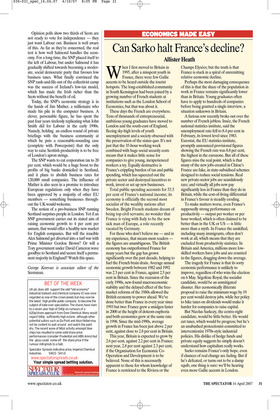ECONOMICS MADE EASY
Can Sarko halt France’s decline?
Allister Heath
When I first moved to Britain in 1995, after a misspent youth in France, there were few Gallic accents to be heard outside the tourist hotspots. The long-established community in South Kensington had been joined by a growing number of French students at institutions such as the London School of Economics, but that was about it.
These days the French are everywhere. Tens of thousands of entrepreneurial, ambitious young graduates have moved to London and the south-east of England, fleeing sky-high levels of youth unemployment and a society obsessed with the preservation of the status quo. It’s not just that the 35-hour working week combined with huge social security costs means that it makes little sense for companies to give young, inexperienced workers a try. Equally destructive is France’s crippling burden of tax and public spending, which has squeezed out the private sector and destroyed incentives to work, invest or set up new businesses.
Total public spending accounts for 53.5 per cent of France’s national income; its economy is officially the second most socialist of the wealthy nations after Sweden. Bright French students dream of being top civil servants; no wonder that France is vying with Italy to be the new sick man of Europe, a role recently vacated by Germany.
For those who don’t believe me — and in my experience, that means most readers the figures are unambiguous. The British economy has outperformed France for many years but the gap has grown significantly over the past decade, helping to fuel the French brain drain. Average annual economic growth between 1982 and 1992 was 2.3 per cent in France, against 2.5 per cent in Britain. Since the recession of the early 1990s, new-found macroeconomic stability and the delayed effect of the freemarket reforms of the 1980s allowed the British economy to power ahead. We’ve done better than France in every year since 1993 but two: France grew a smidgen faster in 2000 at the height of dotcom euphoria and both economies grew at the same rate in 1998. Since the mid-1990s, average growth in France has been just above 2 per cent, against close to 2.8 per cent in Britain.
This year, Britain is expected to grow by 2.6 per cent, against 2.2 per cent in France; next year, 2.8 per cent against 2.3 per cent, if the Organisation for Economic CoOperation and Development is to be believed. None of this is necessarily apparent to those for whom knowledge of France is restricted to the Riviera or the Champs Elysées; but the truth is that France is stuck in a spiral of unremitting relative economic decline.
Perhaps the most damaging consequence of this is that the share of the population in work in France remains significantly lower than in Britain. Young graduates often have to apply to hundreds of companies before being granted a single interview, a situation unknown in Britain.
A furious row recently broke out over the number of French jobless. Insée, the French national statistics institute, said the unemployment rate fell to 8.4 per cent in February, its lowest level since 1983. Eurostat, the EU statistics institute, promptly announced provisional figures showing the French rate was 8.8 per cent, the highest in the eurozone. But all of these figures miss the real point, which is that many of the new jobs created in Chirac’s France are fake, in state-subsidised schemes designed to reduce social tensions. Real new private-sector jobs are scandalously rare; and virtually all jobs now pay significantly less in France than they do in Britain, while the cost-of-living differential in France’s favour is steadily eroding.
To make matters worse, even France’s supposedly strong performance on productivity — output per worker or per hour worked, which is often claimed to be better than in the UK or US — is little more than a myth. In France the unskilled, including many immigrants, often don’t work at all, which means that they are excluded from productivity statistics. In Britain and America, millions more lowskilled workers have jobs and are counted in the figures, dragging down the average.
The tragedy for France is that its sorry economic performance is unlikely to improve, regardless of who wins the election on 6 May. Ségolène Royal, the socialist candidate, would be an unmitigated disaster. Her economically illiterate proposal to raise the minimum wage by 19 per cent would destroy jobs, while her policy to hike taxes on dividends would make it harder for companies to raise capital.
But Nicolas Sarkozy, the centre-right candidate, would be little better. He would cut taxes, which would be progress; but he’s an unabashed protectionist committed to interventionist 1970s-style industrial policies. His dislike of hedge funds and private equity suggests he simply doesn’t understand how capitalism really works.
Sarko remains France’s only hope, even if chances of real change are fading. But if he’s defeated, or turns out to be a damp squib, one thing is sure: we’ll be hearing even more Gallic accents in London.


































































 Previous page
Previous page